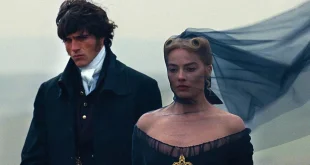Writer/director Sam Mendes’s visual, fictionalized account of a WW1 incident told to him by his grandfather, Alfred Mendes; “1917” differs from traditional “war” films in its intimacy; two British corporals sent on a death-defying mission, through still volatile, vacated enemy lines, to cauterize an attack by an ally battalion, an attack, orchestrated by the Germans, risking the lives of 1,600 soldiers; the brother of “Lance Corporal Blake” (eminent performance by Dean Charles- Chapman) is part of the battalion; accompanied by “Lance Corporal Schofield” (superb, sensitive George MacKay) the two’s journey had to be accomplished within a day’s time.
Startling, remarkable cinematography (Roger Deakins) enhances the “stream of consciousness”, moment to moment maneuverability of the corporals as they progress through a landscape that divulges, more than dialogue, the savagery of “man’s inhumanity to man”. Furthermore “1917” is a commentary on man’s initiative to extricate the extraordinary, harboring at his core; salient courage pulsates throughout this gorgeous, magnificently filmed movie. Cameo roles by Colin Firth, Benedict Cumberbatch, Mark Strong, Andrew Scott lend dignity, legitimacy to Mendes’ homage to Alfred Mendes (1897-1991).
Films focusing on WWI have slipped in notoriety, and garnish a distant second against WWII features; recent exceptions, “They Shall Not Grow Old” and “War Horse” cannot compete with “Dunkirk”, “Darkest Hour” and inimitable “Schindler’s List” (re-released in 2018, honoring its 25th anniversary); literature scores in its educational, emotional, personal value: “All Quiet on the Western Front”, by Erich Maria Remarque; “The Guns of August”, Barbara W. Tuchman, and my consummate favorite Mark Helprin’s “A Soldier of the Great War”; the written word resonates long after consumed.
“1917’s” gripping intensity reaffirms the magic of filmmaking, elucidating the brilliance behind the camera, the genius of the filmmaker!
FOUR STARS!!!!
Peneflix
 Peneflix MOVIE REVIEWS BY PENEFLIX
Peneflix MOVIE REVIEWS BY PENEFLIX





